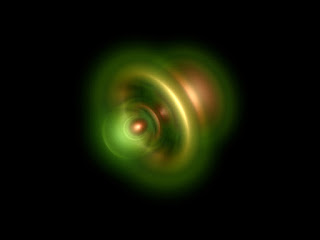 |
| Electron snapshot: the probable position of the remaining helium electron after photoionization. (Courtesy: M Ossiander/ TUM, M Schultze/ MPQ) |
Topics: Applied Physics, Bose-Einstein Condensate, Condensed Matter Physics, Materials Science
Fresh evidence for a new state of matter called a supersolid has been put forth by two independent teams of physicists. Supersolidity has been a controversial concept whereby some atoms in a solid material are able to form a superfluid at very low temperatures – allowing them to flow ghost-like through the solid without any resistance. While initial observations of supersolidity in solid helium-4 in the 2000s have since been explained in terms of more mundane physics, some physicists believe that supersolids should exist – at least in principle. Now, Wolfgang Ketterle and colleagues at the Massachusetts Institute of Technology in the US and Tilman Esslinger and colleagues of ETH Zürich in Switzerland have created supersolid analogues using ultracold atoms. Both systems comprise Bose–Einstein condensates (BEC), which are already superfluids. The teams used different optical techniques to make the atoms arrange themselves into crystalline structures of high and low density resembling a solid. They then showed that the atoms can flow freely through such crystals, while the regions of high and low density do not move. While these experiments involve dilute gases, rather than actual solids, both studies show that the supersolid state of matter is possible. Both experiments are described in preprints on arXiv.
Physics World: Have supersolids been seen at last? Hamish Johnston
Comments